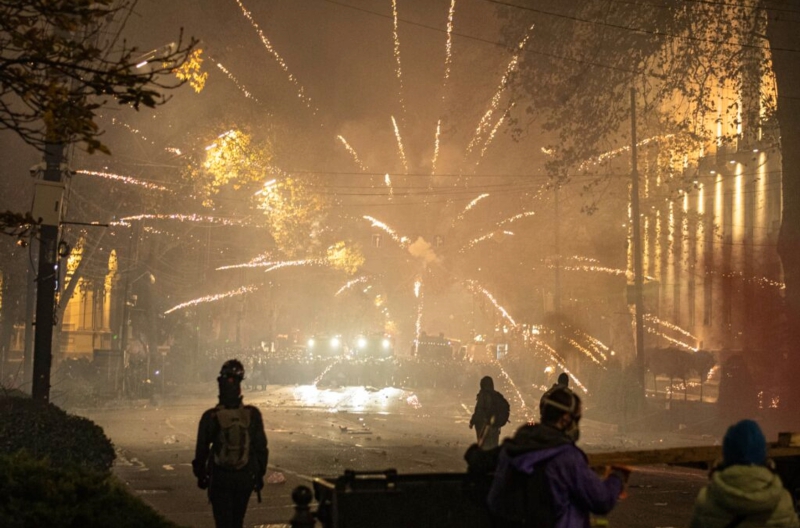The Constitutional Court of Georgia recently refused to consider the lawsuits filed by President Salome Zourabichvili and a group of opposition figures, who demanded that the results of the October parliamentary elections be canceled. The Court emphasized that the decision was final and not subject to review. Meanwhile, since late November, street protests have erupted with renewed vigor. Crowds numbering in the thousands gather daily outside the parliament building in Tbilisi.
According to experts interviewed by The Insider, after the Constitutional Court’s refusal to consider lawsuits regarding the election results, legal methods of political struggle can be considered exhausted, and the opposition has only the option of street protest if it is to stay in the fight. None of the opposition candidates who made it into parliament (from Coalition for Change, the United National Movement, Strong Georgia, and For Georgia) have accepted their mandates. The work of parliament, which held its first session on Nov. 25 in the absence of opposition deputies (only Georgian Dream representatives were present), has been effectively paralyzed by protesters.
Marcel Rötig, director of the regional branch of the Friedrich-Ebert-Stiftung (FES South Caucasus), notes that the Constitutional Court refused to consider the political opposition’s claims “for formal reasons.” He says that there are compelling reasons to doubt the judicial body’s impartiality:
“The lawsuits may indeed have had formal legal flaws, but we must remember that there are doubts about the independence of the Constitutional Court from Georgian Dream. Theoretically, some of the issues could be referred to the European Court of Human Rights. But this would take time, and the prospects for such a lawsuit are unclear. So Zourabichvili appears to pin her hopes on protesters and international pressure.
Three of the four opposition parties that made it into parliament have given up their seats. The fourth, former Prime Minister Giorgi Gakharia's For Georgia, has not yet made any commitments but has stated the parliament is illegitimate.”
Olesya Vartanyan, an expert on conflict and security issues in the South Caucasus, told The Insider that the Georgian parliament is not working:
“So far, none of the opposition politicians have accepted their mandates. Three of the opposition parties that made it into parliament have formally petitioned to withdraw theirs. This decision should be made in line with a special procedure that involves the participation of the parliament, but the parliament is not in session yet, as we have had protests for a week already. The fourth party says they are undecided and that they want to bargain for something in return for accepting mandates. If nothing changes, Georgia faces the threat of a single-party parliament.
At the moment, it is impossible to get into the parliament building. It has been barricaded on all sides. Special forces are constantly there, crowds are gathering, and the fighting goes on until five in the morning.”
Davit Khajishvili of the United National Movement, an MP of the previous Georgian Parliament, is convinced that the Constitutional Court's decision is the ultimate confirmation of its dependence on the ruling party. He says that revolution is the only way forward:
“The Constitutional Court was offered a last chance to prove to the people of Georgia its independence from the government, but unfortunately it missed the opportunity, proving instead that it is controlled by Ivanishvili and Georgian Dream. At first, they registered our claims about violations in the election, but then, most likely due to pressure from the powers that be, they decided to refuse both the deputies and the President of Georgia. This proves once again that they are not free.
It's all in the hands of the people now. As long as the people come out and prove that no one will remain silent, we [the opposition] will do as much as possible to defend our European future. We can see how the situation is evolving in Tbilisi, Batumi, and other cities. Many have been detained, and all of them badly beaten; many required surgeries. One young guy, 22 years old, lost an eye, and he's in a coma. [As of the morning of Dec. 5, Alexi Tirkia, 22, remains in a medically induced coma for the third day. A gas cannister hit the young man in the face and he was taken to hospital with an open head injury.] This is what it comes to when Kremlin puppets sit in the government. Only revolution can help, and nothing else will calm the people of Georgia now. But it has to be peaceful, as it was in 2003.”
On the morning of Dec. 5, Georgian media noted that the previous night, for the first time in a week, there were no clashes between protesters and police. The Mtavari TV channel published a list of names and positions of law enforcement officers responsible for the use of violence in dispersing the rallies. The outlet claims to have received the list from a source in the Interior Ministry. “Ivanishvili's special forces operate without identification numbers and under masks, so their identities remain hidden, but now their names will be known to all of Georgia, as well as their family members, friends, and relatives,” the statement said. The list contains over 100 names.
The day before, Tbilisi police began raids on the offices of opposition parties and movements. Nika Gvaramia, a leader of the Coalition for Change, was detained and, according to eyewitnesses, severely beaten. According to Mtavari, Gvaramia was charged with an administrative offense — disobeying the demand of a police officer — and was placed in custody.

